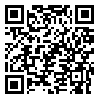BibTeX | RIS | EndNote | Medlars | ProCite | Reference Manager | RefWorks
Send citation to:
URL: http://jrh.mazums.ac.ir/article-1-102-en.html
Background and Purpose: Commitment is related to better communication, greater happiness and more constructive behavior during difficulties, therefore it is important and thus the study of factors that play role in marital commitment would be important. The aim of this study was investigating religiosity and its dimensions in predicting marital commitment of personnel of state welfare organization of Northern Khorasan.
Materials and Methods: This study is a descriptive–correlation study. The study populations were all married personnel of offices of Northern Khorasan welfare organization in 2013 and the sample consisted of 155 persons (67male and 88 female) that were selected by multi stage cluster sampling. Adams and Jones dimensions of commitment inventory along with Glock and Stark Religiosity Questionnaire were used in data gathering. Data analysis was performed by SPSS18 software and using Pearson Correlation and linear regression methods.
Results: showed that the religiosity and its dimension positively and significantly correlated with marital commitment (r = 0.548, p < 0.01) and they are important predictor for marital commitment So that about 30% of variance of marital commitment can be explained by religiosity. Also results showed that the correlate between marital commitment with age (r = 0.29), number of children (r = 0.33) and Length of marriage (r = 0.299) was positively and significant(p < 0 .01).
Conclusion: Results of present study show that religion is a promoter of commitment in person and in the institution of marriage and religiosity provides sacred purposes for Marriage, thus promotion and extension of religious beliefs can enhance fidelity and commitment in the relation of the spouses.
Received: 24 October 2013 Revised: 4 September 2014 Accepted: 21 September2014
J Religion & Health 2014 2(1) :….( Persian)
| Rights and permissions | |
 |
This work is licensed under a Creative Commons Attribution-NonCommercial 4.0 International License. |





